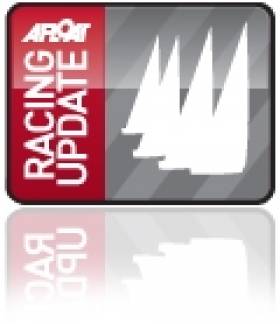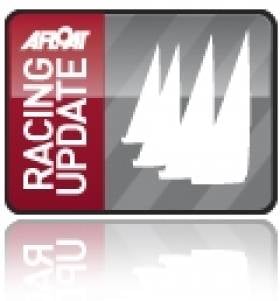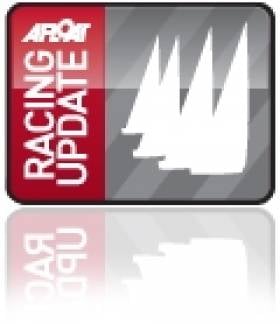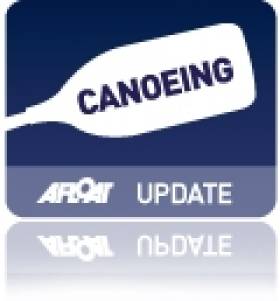Displaying items by tag: racing
Kenefick Steers Chimp to Overall Win at Half Ton Classic Cup
Whilst there was disappointment at losing the two final races it was clear that all felt their Champions were worthy winners and at the prize giving Hampshire's Michael Kershaw and the crew of Chimp received a rousing reception as they claimed the trophy. Helmed by Cork's George Kenefick the crew also included Graeme Love, Ian Brown, Roger Merino and Ed Fitzgerald.

Helmsman George Kenefick from Royal Cork and Chimp crew pick up their prizes. Photo: Fiona Brown
Howth's King One skippered by Dave Cullen finished 14th, not having completed the final three races of the series.
Speaking after racing Michael Kershaw was both thrilled and a little surprised to find himself holding the trophy noting that his crew selection came about as much through luck as judgement and that they had never sailed together as a crew before the first race of the championship. He praised the outstanding quality of the competition and thanked the members and staff of the Royal Corinthian Yacht Club, Race Officer Rob Lamb and his team, the Half Ton Class and Richard and Ursula Hollis who led the Regatta Committee for what he described as a fantastic marker event for the class with so many boats. Certainly 38 boats is possibly the biggest gathering of Half Tonners ever, including the Half Ton Cups of the class's heyday in the 1980s.
Half Ton Classic Cup Day 4
Completing the podium line up were defending champion Philippe Pilate's French team aboard General Tapioca, a 1978 Berret, and Concorde, the 1989 Gautier design, owned by Francis Marshall from Cornwall. The battle for third between Concorde, Tim and David Cunliffe's Insatiable and Robbie Tregear's Per Eilsa had been fierce and Francis Marshall was thrilled to receive his third prize having beaten both boats by just 1.7 points. Insatiable claimed fourth on count-back with Per Elisa fifth.
In the Production Boat Division the winner was Francois Michelin's Chani, one of Ron Holland's wonderful Golden Shamrocks. In second place was the SJ32 Fletcher Lynd, owned by Fredric Denis, and Michael Langhan's Albin Ballad Strolch came third.
There were also plenty of humorous prizes including a bucket and spade for Sibelius who went aground on Ryde Sands, a No Parking sign for Red Cloud who took up temporary residence on one of the marks, and a Best Party Games book for Hullabaloo XV who were the last the leave the bar every night! Special prizes were also awarded to General Tapioca, Ian Van Burn's Fantasy and Toni Stuschek and Janne Tulokas' Blues in recognition of having competed in all five editions of the revival Half Ton Classic Cup.
Arguably one of the most important prizes of the entire event is the Half Ton True Spirit Trophy, which is awarded not to the winning team, but to the team that best represents the true spirit of camaraderie and competition in the Half Ton Classic Class. The members of the fleet elect the winner and by a massive number of votes the 2011 recipient was confirmed as Jean-Benoit Boels' Envol crewed by Diego Boels, Lionel Coquelet, Bert Jansen, Olivier Michel, Adrien Michele and Tom Jansen. At 11 years old Tom Jansen was also the youngest competitor and it was a lovely sight to see him proudly holding aloft the keeper prize, a unique canvas printed photograph by local photographer Hamo Thornycroft.
Class Chairman Bert Jansen concluded proceedings by once again thanking the 38 teams from seven nations for making the trip to Cowes and invited them to join him for the 2013 edition of the Half Ton Classic Cup, which will be held in France at a venue to be confirmed.
A race win for Dave Cullen's King One leaves the Howth boat tenth after day three of the Half Ton Classic Cup.
When the Solent is on form there is no better place in the world to sail and it delivered in spades for the third day of racing at the 2011 Cup supported by South Boats. Three more races were completed, two windward/leewards followed by a round the cans course, bringing the total number of races sailed to seven. The wind ranged from 7-8 knots in the morning up towards twenty during the afternoon and the sun shone all day, more than making up for yesterday's wet and misty conditions.
The mix of racing formats went down well with the competitors and once again Rob Lamb and the Royal Corinthian's Race Committee did an excellent job of managing the races, with the team kept busy regularly tweaking the mark positions on the windward/leeward courses. It was a day that required patience and steady nerves with the wind often coming down in streaks. Boats only a matter of yards apart could be sailing in winds of significantly different strength and direction - described ruefully by Chimp's tactician Roger Merino as "the splatter effect".
One of the most marked characteristics of this event is how incredibly close the racing is. Yet again today there were multiple cases of boats finishing within seconds of each other. Every mark rounding brought close quarters action and this evening the protest committee were in business again adjudicating on a leeward mark incident during race six, the second race of the day, involving David Evan's Hullabaloo XV, Christopher Haworth's Beat & Run and Robbie Tregear's Per Elise. Hullabaloo XV was found to be in the wrong and was disqualified - a great disappointment as they had finished the race in eighth place.
Each race today had a different winner and whilst many of the familiar faces continued to feature it was great to see some new names making it into top ten as well. Race five was won by Philippe Pilate's General Tapioca with Jean-Philippe Cau's Sibelius 29 seconds behind her and Alain Delvaux's Waverider third. Race six went to Waverider by 18 seconds from Chimp with General Tapioca third. In the final round the cans race David Cullen's King One took victory by 52 seconds - the biggest winning margin of the day, Chimp was second and General Tapioca third.
For overnight leader Chimp, it was a day of consolidation and pleasant surprises. As they came ashore they knew they had finished fourth in race five but races six and seven were too close to call and they feared they were fifth or worse so were delighted to come ashore and find they had in fact come second in both races. As a result they extend their overall lead of the championship to nine points. Moving back up into second place is General Tapioca with 29 points, 11 adrift of Chimp. Insatiable added eight, ten and six to her score card and holds onto third place, ten points behind General Tapioca. Chani had a mixed day and really struggled in the round the cans race, finishing 24th, so drops down from second to fourth.
In the Production Boat Series Chani is leading the fleet with Fredric Denis' Fletcher Lynd second and Mcihael Langhans' Strolch third.
Tomorrow three further races are planned. Racing continues until Friday 26th August with up to 12 races scheduled. Once eight races have been sailed a second discard will come into play. The forecast for tomorrow is for overcast and possibly rainy conditions with around 15 knots in the morning, dropping to perhaps 7 knots during the afternoon as the skies clear.
Racing Round Up - Weekend Irish Sailing Review
Racing Round up: Dragons, British IRCs, Flying Fifteens, WIORA, ISA Youths, Fastnet and Bay racers
Racing Round up: Dun Laoghaire Regatta, ISAF Youths, Optimists, Paralympic, RORC, WIORA, Quarter Ton, Kiteboarding.
In offshore news, the Transatlantic Race 2011 Nears a Finish, and RORC yachts that headed West did best in the St Malo from Cowes race. Ireland's entry in the Tall Ships race, Celtic Mist, is safely in Scotland. WIORA starts this week in Clifden, thirty boats are expected.
Two top Cork performers are in Cowes for this week's Quarter Ton Cup.
In other boating news, rower Siobhan McCrohan won bronze at the World Rowing Champs in Lucerne, Kiteboarding debuted in Dun Laoghaire. There were Medals for Irish Kayakers at Athens Special Olympics.
And finally after a Elaine 'Shooter' Alexander is set for hero's welcome this week as she becomes the first woman from Northern Ireland to circumnavigate the island of Ireland.
All on our home page this morning, thanks for your interest in Irish Sailing and Boating.
Match Racing Challenge Hot Seat a Pricey Gift
You could be in the hot seat at next month's International Match Racing Challenge - provided you'e got €200 to spend.
The top-level entertainment package for the Royal St George Yacht Club's second annual event, set for the weekend of 23-24 July, will put yacht racing fans on board with a team "experiencing the thrills and tension of the race as it happens along with the competitors".
A spectator package - which will set fans back €100 - gives a bird's-eye view of all the racing in Scotsman's Bay "as well as the added bonus of firing the starting gun", according to the RSGYC.
The second International Match Race Challenge will see Ireland’s top six match racing teams go head to head against a world team consisting of six international crews from France, Germany, Australia, New Zealand and the UK. Ireland will be hoping to avenge their 36-29 loss to the world at last year's inaugural event.
Match racing involves head-to-head racing between two identical boats over short 20 minute courses, with each boat having four crew members. At the end of the competition and after approximately 90 races, there will be an overall individual winner. In addition, the combined scores of the six Irish teams and the six international teams will deliver an overall team winner.
Package One
THE HOT SEAT
€200 per person
Experience the thrills and tension of the race as it happens aboard!
12:00 Meet and Greet in Club
12:30 Race Briefing and Intro to the Event
12:45 Light Lunch
13:30 Trip on Yacht around Dublin Bay
14:30 Arrive at Spectator area to watch racing
15:00 Hot Seat Race
16:15 Return to shore
16:30 BBQ and Drinks
Hot Seaters need to be prepared to get wet and be active!
Package Two
PURE SPECTATOR
€100 per person
Get a Bird's Eye view of all the action!
12:00 Meet and Greet in Club
12:30 Race Briefing and Intro to the Event
12:45 Light Lunch
13:30 Trip on Yacht around Dublin Bay
14:30 Arrive at Spectator area to watch racing
15:00 Step on Board the Starter's Boat and fire the Starting Gun
16:00 Return to shore
16:30 BBQ and Drinks
Racing update: DBSC, ISORA, Royal St. George Knights, Olympic Keelboat Drama and Kinsale's Club House
Abroad, Keelboats are out of the Olympic Games (and kitesurfing is in!). Royal St. George Knights were quarter finalists at the British Team Racing Champs. There is video too with Irish commentator Jimmy Fitzpatrick.
Should Kinsale Yacht Club move or rebuild a crumbling premises?
Crowds Come Out for An Tóstal Revival
Currach teams from around Ireland came together in Galway Bay last weekend for the revival of the An Tóstal Fesival, the Irish Times reports.
Up to 10,000 spectators are believed to have watched the nine Galway hookers brave the winds over two days of sailing in the event, the first in almost 50 years.
Members of the winning currach team from 1955 An Tóstal were also on hand for the opening ceremony.
The Irish Times has more on the story HERE.
Ireland to Join World's Top Team Racers for UK Battle
In less than a month's time, Dun Laoghaire's Royal St. George Yacht Club will join the world's best team racers in the United Kingdom for the sixty-second edition of the Wilson Trophy British Open Team Racing Championship, hosted and organised by West Kirby Sailing Club.
This year's Wilson Trophy, which will take place on the Marine Lake in West Kirby from the 6 - 8 May, has, as expected, attracted another high quality entry list, with the 32 selected teams coming not only from the length and breadth of the United Kingdom, but from Ireland and the United States as well.Sailing in identically matched, colour coded Firefly dinghies, used exclusively for this event, the 32 teams will fight it out over three days of Swiss league and elimination rounds, culminating in a thrilling Grand Final to be sailed in front of a packed spectator grandstand on the final afternoon.
The Wilson Trophy is a major logistical undertaking. Over the 3 days, more than 300 races are started, finished, accurately scored and uploaded to the online rolling results service. On the water, a twenty-five strong team of international umpires are on hand to give instant decisions on rule infringements and dish out the appropriate penalties. And to keep the throngs of spectators on shore happy and well informed, an expert commentary team broadcasts live updates on all the action out on the lake.
With many of the teams yet to confirm their final sailor line-up, an assessment of potential form is difficult at this stage. Suffice it to say however that the great and the good of the team racing world will be in West Kirby for this year's Wilson Trophy.
2010 winners, Team Extreme from the USA are back to defend their title and will be looking to reproduce the calm and composure with which they swept undefeated through the qualification rounds last year, before inflicting an uncharacteristic and uncomfortable 3 - 0 whitewash defeat on local heroes the West Kirby Hawks, in the Grand Final. For their part, the West Kirby Hawks will no doubt be out for revenge and keen to expunge the memories of that 2010 final. If recent form is anything to go by, the the Hawks look to have hit their peak at just the right time. By all accounts they were on ruthless form at the recent UK RYA National Team Racing Championship; blazing through the elimination rounds undefeated before summarily dismissing locals Spinnaker Auspicious in the final, to retain their UK National Team Racing Champions title.
However with top quality teams like the Woonsocket Rockets (USA), the Royal St George Yacht Club (IRL) and the New York Yacht Club (USA) and several others with their eyes fixed on a Wilson Trophy victory, Team Extreme and the West Kirby Hawks will have their work cut out if they are to set up a return Grand Final showdown.
Entry for Canoe Slalom Team Trials Closes This Weekend
Entry closes this Sunday for the Canoeing Ireland slalom team trials and selection races, scheduled for 16-17 April.
Canoeists hoping for selecton must compete in a total of three events over the weekend. at the Sluice Weir in Lucan, Co Dublin.
Entry forms are available from the Canoeing Ireland website HERE.
Entries must be submitted by e-mail before 5pm on Sunday 10 April, with signed forms payment sent as soon as possible to the Irish Canoe Union.





































































